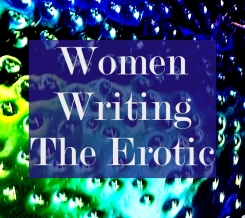 In this series (within the 130 authors survey), I’ll be sharing women’s views on exploring sexuality through fiction.
In this series (within the 130 authors survey), I’ll be sharing women’s views on exploring sexuality through fiction.
Which themes tug to be unravelled and explored?
What motivates us, challenges us, empowers us – as readers and as writers?
Women are not only the predominant readers of erotica but form the lion’s 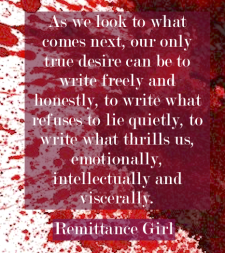 share of authors, and our voices are growing louder.
share of authors, and our voices are growing louder.
More of us than ever are letting rip on the page, opening our sexual imagination. As we know, when it comes to erotic fantasy, it’s more fun when you’re sharing.
Women continue to face battle after battle for equal rights, respect and recognition, across every sphere imaginable, but when it comes to erotic fiction, our feet are firmly under the table.
Perhaps, just perhaps, we’re stepping into an age where we’ll have the freedom to read (and write) what we damn well like: within the pages of erotic fiction, and beyond.
In her interview with The Paris Review, Ursula K. Le Guin nailed it in saying: ‘Don’t shove me into your damn pigeonhole, where I don’t fit, because I’m all over. My tentacles are coming out of the pigeonhole in all directions.’
 There’s still a degree of censorship, and traditional publishers remain somewhat cautious about stepping outside of the box, but, if we keep writing up against the boundaries, inch by inch, they will surely come down.
There’s still a degree of censorship, and traditional publishers remain somewhat cautious about stepping outside of the box, but, if we keep writing up against the boundaries, inch by inch, they will surely come down.
As Remittance Girl notes, on her website manifesto: ‘As a woman, I have inherited the burden of thousands of years of social, religious and sexual oppression. My understanding of self, my agency, my language and my sexuality were born, molded and twisted by that oppression. I am happy to have a discussion on why I write what I write, but I will not tolerate being told what I can or cannot write about.’
Brantwijn Serrah admits to considering using a pseudonym for her first title outside of the genre, believing that preconceptions exist as to who can write what. She asserts, “Erotica, being conceived as a subgenre of romance, seems to be the realm deemed most appropriate for women to write, while adventure, fantasy and science fiction appear to be realms reserved for men. The perception that women are good for sex while men are the ones trusted with more “serious” business is an offensive and disappointing reality.”
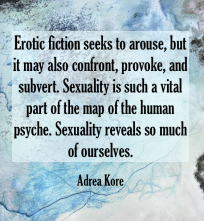
Remittance Girl comments, “Erotica can be breathtakingly beautiful because it’s about us at our most naked, our most vulnerable. It is an exposure of both our passions and our hideous flaws. Our destructive jealousy, our brittle pride, our hunger for what doesn’t belong to us, our need for the strange and the transgressive.”
I’m keen to see men embracing erotica too: sending a big cheer to all men writing and reading sexually-themed stories (read more about male authors of erotic fiction here). However, when women write ‘the erotic’ it makes my heart sing.
Some would argue that gender is irrelevant to how we approach the page as writers, that we have the ability to portray any human being, from any time in history, and from anywhere. All that’s needed is imagination.
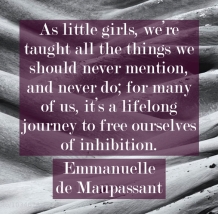 It’s true that some elements of the human condition are universal. We all, surely, know what it is to love, to despair, to smile, or to regret. We know the fragility of life and we share wonder in the world we inhabit.
It’s true that some elements of the human condition are universal. We all, surely, know what it is to love, to despair, to smile, or to regret. We know the fragility of life and we share wonder in the world we inhabit.
And yet, as women, aren’t we best placed to portray what it’s like to walk in our skin?
Double-standards, Repression and Censorship
As little girls, we’re taught all the things we should never mention, and never do; for many of us, it’s a lifelong journey to free ourselves of inhibition.
Adrea Kore reminds us, “Women writing and speaking about their own desire, being open with what gives them pleasure and turns them on … even finding the words for that is something that is still seen as taboo in corners of Western culture, let alone in comparison to cultures where women are more repressed ideologically, and socially.”
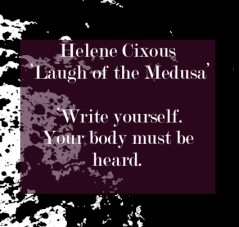 As Cecilia Tan states, “I was put on Earth to write but it wasn’t until I started writing erotic fiction that I found my voice. I want a world where sexual freedom, not sexual oppression, is the norm, and so I write about sexual pleasure and fulfillment.”
As Cecilia Tan states, “I was put on Earth to write but it wasn’t until I started writing erotic fiction that I found my voice. I want a world where sexual freedom, not sexual oppression, is the norm, and so I write about sexual pleasure and fulfillment.”
Ina Morata comments, “Sex is the medium I use to investigate psychological boundaries: my personal insecurities and fears. I explore who I am and see how far I can push myself. Erotica, more than any other genre I have worked in, allows me to do this without feeling contained or isolated.”
Adrea sees erotica writing, particularly as a female author, ‘as a political act 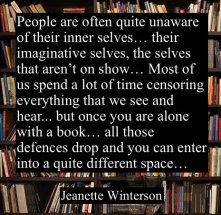 as well as a creative one’. She explains, “French feminist Helene Cixous phrased it beautifully in an essay called ‘Laugh of the Medusa’ – ‘Write yourself. Your body must be heard.’ I think this applies to all women’s stories, but particularly those around sexuality. The political aspect of it, the desire to confront and subvert, is a strong motivation for me – as strong as the desire to seduce and arouse.”
as well as a creative one’. She explains, “French feminist Helene Cixous phrased it beautifully in an essay called ‘Laugh of the Medusa’ – ‘Write yourself. Your body must be heard.’ I think this applies to all women’s stories, but particularly those around sexuality. The political aspect of it, the desire to confront and subvert, is a strong motivation for me – as strong as the desire to seduce and arouse.”
Brantwijn Serrah notes that her focus is on women’s pleasure and the satisfaction of ‘the sexual spirit we are programmed, as women, to suppress or deny’. She notes, “When I write from a male point of view, I’m aware of the disparity, the ‘privilege’ of men to express sexual interest while women still struggle with this.”
Lily Harlem explains that she loves to write heroines who ‘break the rules’, but laments 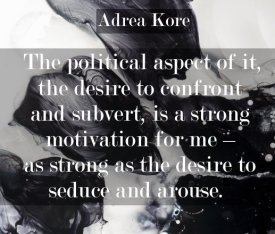 that some readers have criticized her writing of female protagonists who lack ‘the same moral compass’ as themselves. She notes, “I call these cardboard cut out heroines. From my personal experience, people make crazy decisions when it comes to love and passion.” She asserts that ‘flawed, impulsive, manipulative heroines’ breathe life into fiction.
that some readers have criticized her writing of female protagonists who lack ‘the same moral compass’ as themselves. She notes, “I call these cardboard cut out heroines. From my personal experience, people make crazy decisions when it comes to love and passion.” She asserts that ‘flawed, impulsive, manipulative heroines’ breathe life into fiction.
Elizabeth Safleur underlines, “Men and women are still pressured to conform to certain standards. What’s odd is how hypocritical those standards can be. Be attractive! Be Sexy! Attract a mate! Yet, not too much. The minute anyone takes full ownership of their attractiveness, sexuality and relationships, they are deemed too aggressive or too [insert negative label of choice]. Both men and women fall under pressure, albeit differently, to conform to others’ ideas of what is acceptable. I can’t help but tell these stories because I see (and have experienced) the cost of burying yourself and your sexual urges under layers of ‘I shouldn’t be like this’ or ‘I shouldn’t want this’. I hope people find kindred spirits in my characters.”
Writing Beyond Conventions
Almost half of the authors responding to the 130 Authors survey mentioned, to some degree, discontent with formulaic, restrictive expectations and publishing ‘rules’.
Shanna Germain asserts that she wants readers to ‘question assumptions’. She explains, “I like to give people a slant-mirror. Not a perfect reflection of themselves, but a could-be reflection.”
Nya Rawlyns adds, “Much of what passes for erotica today feels stale, too often reflecting romance tropes. Lust and desire, needs and wants… all have consequences. I’m interested in how an individual changes under conditions of denial or when personal and other boundaries are smashed.”
Similarly, Jade A Waters states, “Sex is transformative. I tend to take my characters on journeys of discovery, often as an echo of something I’ve learned in my own life.”
Erotica lends itself well to exploration of ‘grey areas of morality’, as Tobsha Learner calls them: to the small lies we tell ourselves, and to the ways in which we manipulate or make use of others.
Adrea Kore emphasizes, “Erotica writes into areas of the human sexual psyche and behaviour that some genres gloss over or shy away from. Erotica brings into the light contradictions between our inner sexual desires and our outward behaviour. What do we secretly long for, and to attain that, what lengths would we go to?” (more here)
In particular, 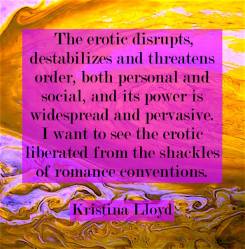 some authors mention a desire to explore the realm of non-consent.
some authors mention a desire to explore the realm of non-consent.
Christina Mandara laments, “I love non-consensual elements in erotica but the world at large has decided that this isn’t acceptable. It seems that women, particularly, must have consensual, hearts and flowers stories.”
Kristina Lloyd feels similarly that there is potential to explore ‘the erotic’ beyond the ‘shackles of romance conventions’.
As Anne Rice notably stated in The Guardian newspaper (2012), erotica writers seek freedom to explore. With particular reference to women, Ms. Rice states: ‘As a feminist, I’m supportive of equal rights for women, and that includes the right of every woman to write her sexual fantasies and to read books filled with sexual fantasies that she enjoys. The whole world knows women are sensual human beings as well as men. It’s no secret anymore that women want to read sexy fiction just as men do, and there’s a new frankness about the varieties of fantasies one might enjoy. So many cliches have been broken and abandoned. And this is a wonderful thing.”
Sorcha Black believes that many books named as ‘too graphic or taboo’ are those aimed at women. She underlines, “The policing of women’s sexuality still includes censoring what we read.”
Malin James asserts that her writing of erotic elements wasn’t a ‘conscious decision’ but that she began to feel stifled by avoiding sexual themes. She notes, “It stifled my work and, as a writer, that sort of self-censorship was discouraging and unproductive. Censorship is a complicated issue and to 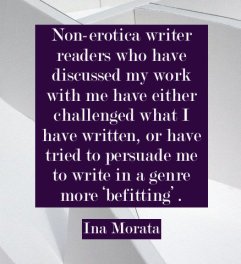 preoccupy myself with it as I write would be to stymie the story before it’s even formed. While I acknowledge the reality of censorship, I try not to let it, or fear of it, influence my writing. I serve the story. If it trips censors, so be it. I have the luxury of pulling it and sending it elsewhere.“
preoccupy myself with it as I write would be to stymie the story before it’s even formed. While I acknowledge the reality of censorship, I try not to let it, or fear of it, influence my writing. I serve the story. If it trips censors, so be it. I have the luxury of pulling it and sending it elsewhere.“
KD Grace voices a view raised by a significant number of those who took part in the ‘130 authors’ survey: the lack of respect for the erotic fiction genre in the literary world. Ina Morata echoes this, saying that writers outside of the erotic fiction genre have challenged her, asking why she doesn’t write in a genre more ‘befitting’.
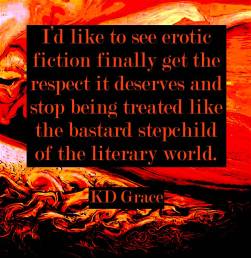 However, KD Grace stresses that this generates an attitude of ‘us against the world and circle the wagons’ and ‘a real sense of camaraderie among erotica writers (with little of the petty jealousy I’ve seen among writers in some other genres).’ She feels the erotica writing community as ‘a family’, saying, “That encouragement has meant a lot to me through the years.”
However, KD Grace stresses that this generates an attitude of ‘us against the world and circle the wagons’ and ‘a real sense of camaraderie among erotica writers (with little of the petty jealousy I’ve seen among writers in some other genres).’ She feels the erotica writing community as ‘a family’, saying, “That encouragement has meant a lot to me through the years.”
Writing Women’s Sexuality
Adrea Kore remembers being in her mid-twenties, studying feminism and theatre, and dating a poet, when she discovered Adrienne Rich’s poem ‘In My Rose-wet Cave’. She recalls the image, of ‘being underwater, and yet botanical. Fragrant and secret. Hidden away, deep-hued and moist’. She tells us, “I was intrigued and delighted. And I began to search for more of this kind of writing, that could re-invent the feminine body, the feminine experience of 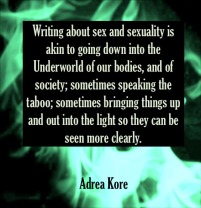 desire. I think it put light on the seed already in me to find new and evocative ways of writing about feminine desire and describing the desiring female body.”
desire. I think it put light on the seed already in me to find new and evocative ways of writing about feminine desire and describing the desiring female body.”
Tabitha Rayne notes that writing erotic fiction, ‘felt like discovering a new colour‘. “I couldn’t stop expressing myself in the erotic. It was like opening a door to myself,” she asserts.
Donna George Storey tells us, “When I got the courage to start writing again as an adult (after getting my B.A. in creative writing and then taking a long writing break as I felt I had nothing interesting to say), all the stories that came out had to do with sexuality. I still find the erotic experience the one 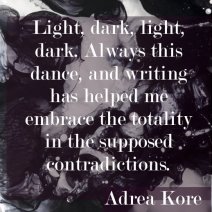 thing that truly inspires me to silence the inner critic and just write and enjoy the pleasure of speaking the unspeakable.”
thing that truly inspires me to silence the inner critic and just write and enjoy the pleasure of speaking the unspeakable.”
Susan St. Aubin comments, “I’m interested in the mystery of human life, and sex is a big part of that, perhaps the thing that most illuminates the mystery.”
Rose Caraway, speaking of her work in audio narration of erotic fiction, tells us, “Together, we’re helping people awaken, at their own pace. Each story narrated acknowledges sexuality, our own and others’, because it’s being read aloud. Those words want to be heard, making us stronger, so that we can better express and own our sexuality.” (more from Rose here)
Adrea notes her fascination with ‘feminine experience of the world’ and stories ‘of growth, transformation and dislocation, felt through and mediated by the body’. She explains, “These were the things that I began to write about: Love and longing. Loss. Translating the physical arts I most loved into words: my experiences of dancing and life-modelling. Then, more arduously, carving out narratives of sexual trauma. Death. Then, the sensual pleasures. Sex. Light, dark, light, dark. Always this dance, and writing has helped me embrace the totality in the supposed contradictions.” (read more on this topic from Adrea here)
Kristina Lloyd relates this to her own journey, saying, “Through writing, I’ve learned so much about my own sexuality and desire. Writing has given me an understanding; it has allowed me to own a sexuality I’d been conflicted about and confused by when I was younger.”
Emerging Changed
Remittance Girl tells us that ‘all fiction carries the traces of its author’. She asserts, “The difference between really good writing and mediocre writing is not when the characters emerge changed, but when you know, as a reader, that the author has also emerged changed.”
In writing, we gain greater understanding of our motivations, our pleasures 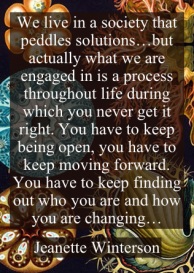 and our fears. We emerge changed and, as RG tells us, we ‘expose something true’ of ourselves (more here).
and our fears. We emerge changed and, as RG tells us, we ‘expose something true’ of ourselves (more here).
Adrea Kore adds, “Language and ideas, once encountered, live inside you, and can effect changes, both subtle and catalytic. Words endure. And the feelings they conjure up in the body can endure too, leaving traces, imprints in the cells, the memory.” (more here)
Write your own truths, write your own pages.
Our voices are here to be heard.
READ ON – Women Writing the Erotic: Part Two and Part Three
Women authors tell us what compels them to write in the erotic genre, including the themes which refuse to lie quietly, their influences and inspirations, and the relevance of gender to their work.
You may also be interested to read:
Also coming soon…
Writing Craft
Authors’ Recommended Reads
Author Influences: theatre, music, art, film, fiction, dance
Among the women writers taking part in the 130 Authors survey were:
Laura Antoniou, Susan St. Aubin, Shanna Germain, Remittance Girl, Malin James, Janine Ashbless, Adrea Kore, Tobsha Learner, Kristina Lloyd, Cecilia Tan, Donna George Storey, Kathe Koja, Justine Elyot, Sorcha Black, Cari Silverwood, Siri Ousdahl, Zander Vane, Tamsin Flowers, Krissy Kneen, Zak Jane Keir, Jade A Waters, KD Grace, Kay Jaybee, Nya Rawlyns, Sessha Batto, Rose Caraway, Tabitha Rayne, Elizabeth Safleur, Devi Ansevi, K. L. Shandwick, I.G. Frederick, Jacqui Greaves, Ina Morata, Elsa Holland, Elizabeth Schechter, Lucy Felthouse, Alexis Alvarez, Lily Harlem, Madeline Moore, Ria Restrepo, Scarlet Darkwood, Victoria Bliss, Jane Gilbert, Charlie Powell, Cate Ellink, Lee Savino, Elizabeth Black, Felicity Brandon, Nicolette Hugo, Amelia Smarts, Sue MacNicol, Cassandra Shaw, Ardent Rose, Sylvia Storm, Renee Rose, Rachel de Vine, Cherry Wild, Patient Lee, Pandora Spocks, Suzette Bohne’ Sommers, Molly Synthia, Meg Amor, Lizzie Ashworth, Cara Bristol, Finn Marlowe, C.A. Bell, Brantwijn Serrah, Aubrey Cara, Kathleen Bradean, Stormchase, Lisa Fox, Allyson Young, Emma Jaye, Dee Maselle, Christina Mandara, Sue Lyndon, Rebecca Branch, Molly Moore, Vanessa Wu, Jaye Peaches, Ashe Barker, Tilly Andrews and Catherine Mazur.
 salacious tales and images based on male servants spying through keyholes, in hope of catching members of the family or staff having sex. This saucy imagery was at its most popular when the ‘butler’ caught a romp taking place between people of different classes; the lord and the maid, or the lady and the stable boy. In other words, the more illicit the liaison, the sexier it was to watch.
salacious tales and images based on male servants spying through keyholes, in hope of catching members of the family or staff having sex. This saucy imagery was at its most popular when the ‘butler’ caught a romp taking place between people of different classes; the lord and the maid, or the lady and the stable boy. In other words, the more illicit the liaison, the sexier it was to watch. Despite their slave status, Anya and Clara are intelligent professional women who’ve chosen employment with Mark Parker – the ultimate voyeur. In their six months of working for Mark, he’s barely touched them, but boy has he watched them in action!
Despite their slave status, Anya and Clara are intelligent professional women who’ve chosen employment with Mark Parker – the ultimate voyeur. In their six months of working for Mark, he’s barely touched them, but boy has he watched them in action! 2018), The Voyeur (Sinful Press, 2018), Knowing Her Place-Book 3: The Perfect Submissive Trilogy, (KJBooks, 2018), The Retreat- Book2: The Perfect Submissive Trilogy(KJBooks, 2018), Making Him Wait (Sinful Press, 2018), The Fifth Floor- Book1; The Perfect Submissive Trilogy (KJBooks, 2017), Wednesday on Thursday, (KDP, 2017), The Collector (KDP, 2016), A Sticky Situation (Xcite, 2013), Digging Deep, (Xcite 2013), Take Control, (1001 NightsPress, 2014), and Not Her Type (1001 NightsPress), 2013.
2018), The Voyeur (Sinful Press, 2018), Knowing Her Place-Book 3: The Perfect Submissive Trilogy, (KJBooks, 2018), The Retreat- Book2: The Perfect Submissive Trilogy(KJBooks, 2018), Making Him Wait (Sinful Press, 2018), The Fifth Floor- Book1; The Perfect Submissive Trilogy (KJBooks, 2017), Wednesday on Thursday, (KDP, 2017), The Collector (KDP, 2016), A Sticky Situation (Xcite, 2013), Digging Deep, (Xcite 2013), Take Control, (1001 NightsPress, 2014), and Not Her Type (1001 NightsPress), 2013.

 protagonists’ comfort zones (and, thereby, those of the reader).
protagonists’ comfort zones (and, thereby, those of the reader). Lady Tia wafted into Elena’s study in a haze of musky perfume. As she clicked on her screensaver, the Scotswoman peered at her assistant over the rim of her glasses. ‘Good evening, Lady Tia. Thank you for coming so promptly.’
Lady Tia wafted into Elena’s study in a haze of musky perfume. As she clicked on her screensaver, the Scotswoman peered at her assistant over the rim of her glasses. ‘Good evening, Lady Tia. Thank you for coming so promptly.’ Kay Jaybee has over 180 erotica publications including, The Retreat- Book2: The Perfect Submissive Trilogy (KJBooks, 2018), Making Him Wait (Sinful Press, 2018), The Fifth Floor- Book1;The Perfect Submissive Trilogy (KJBooks, 2017), Wednesday on Thursday, (KDP, 2017), The Collector (KDP, 2016), A Sticky Situation (Xcite, 2013), Digging Deep, (Xcite 2013), Take Control, (1001 NightsPress, 2014), and Not Her Type (1001 NightsPress), 2013.
Kay Jaybee has over 180 erotica publications including, The Retreat- Book2: The Perfect Submissive Trilogy (KJBooks, 2018), Making Him Wait (Sinful Press, 2018), The Fifth Floor- Book1;The Perfect Submissive Trilogy (KJBooks, 2017), Wednesday on Thursday, (KDP, 2017), The Collector (KDP, 2016), A Sticky Situation (Xcite, 2013), Digging Deep, (Xcite 2013), Take Control, (1001 NightsPress, 2014), and Not Her Type (1001 NightsPress), 2013.
 of a lark.”
of a lark.” the writing process,” Malin asserts. “As for what I’d like people to come away with…empathy I suppose. Or resonance. A sense of understanding — feeling understood and, more importantly, gaining an understanding of situations or people who may fall outside their realm of personal experience. My stories should feel like slices of other people’s lives that the reader can experience in some way.”
the writing process,” Malin asserts. “As for what I’d like people to come away with…empathy I suppose. Or resonance. A sense of understanding — feeling understood and, more importantly, gaining an understanding of situations or people who may fall outside their realm of personal experience. My stories should feel like slices of other people’s lives that the reader can experience in some way.” Sarah Waters, Jeanette Winterson, Anais Nin — explore what it is to live, love, hate, and hurt, and they do so beautifully (and arousingly) with sex. They’re an intersection between the literary and erotic,” asserts Malin. “Their exploration of sexual themes occurs with fearlessness and frankness; it’s the lack of implied apology that appeals most to me.”
Sarah Waters, Jeanette Winterson, Anais Nin — explore what it is to live, love, hate, and hurt, and they do so beautifully (and arousingly) with sex. They’re an intersection between the literary and erotic,” asserts Malin. “Their exploration of sexual themes occurs with fearlessness and frankness; it’s the lack of implied apology that appeals most to me.” She adds, “The Magic Toyshop and The Bloody Chamber, by Angela Carter, have made me aware of my sexuality in a much more complicated way, while Muriel Spark’s The Driver’s Seat has opened my eyes to my own lack of sentimentality, just as Affinity, by Sarah Waters, has made me aware of how deeply my empathy runs. Angela Carter’s emphasis on sexuality as mundane, profane
She adds, “The Magic Toyshop and The Bloody Chamber, by Angela Carter, have made me aware of my sexuality in a much more complicated way, while Muriel Spark’s The Driver’s Seat has opened my eyes to my own lack of sentimentality, just as Affinity, by Sarah Waters, has made me aware of how deeply my empathy runs. Angela Carter’s emphasis on sexuality as mundane, profane  and transcendent has definitely influenced my storytelling. Muriel Spark’s work has given me permission to be unflinching and unapologetic with my characters, and Sarah Waters has taught me to pay attention to physical and emotional details, which are often more telling than paragraphs of exposition.”
and transcendent has definitely influenced my storytelling. Muriel Spark’s work has given me permission to be unflinching and unapologetic with my characters, and Sarah Waters has taught me to pay attention to physical and emotional details, which are often more telling than paragraphs of exposition.” England). She underlines, “My acting training (as well as the critical training I received during my MA) directly influences my writing in many subtle ways: particularly in how I approach characters and the circumstances that inform the narrative arc. I think of writing in terms of lenses and angles—sex is, very often the lens, but the angle is determined by influences, from things I’ve done and read.”
England). She underlines, “My acting training (as well as the critical training I received during my MA) directly influences my writing in many subtle ways: particularly in how I approach characters and the circumstances that inform the narrative arc. I think of writing in terms of lenses and angles—sex is, very often the lens, but the angle is determined by influences, from things I’ve done and read.” published by Go Deeper Press. Malin also names David Ives’ Venus in Fur, for its ‘cleverly subversive viciousness’ and Prelude to a Kiss, for its ‘use of magical realism to examine a woman’s fear of death’.
published by Go Deeper Press. Malin also names David Ives’ Venus in Fur, for its ‘cleverly subversive viciousness’ and Prelude to a Kiss, for its ‘use of magical realism to examine a woman’s fear of death’. than plot. She names The English Patient, Bram Stoker’s Dracula (directed Francis Ford Coppola) and Gilda (starring Rita Hayworth) as influential films for her writing, as well as Hitchcock’s Rear Window, Shadow of a Doubt and Vertigo. “While they’re all very different, there’s something compelling in their emotional landscape: a tension and melancholic tragedy. That said, one of my favorite movies of all time is Clue; I love the ridiculous humor of it.”
than plot. She names The English Patient, Bram Stoker’s Dracula (directed Francis Ford Coppola) and Gilda (starring Rita Hayworth) as influential films for her writing, as well as Hitchcock’s Rear Window, Shadow of a Doubt and Vertigo. “While they’re all very different, there’s something compelling in their emotional landscape: a tension and melancholic tragedy. That said, one of my favorite movies of all time is Clue; I love the ridiculous humor of it.”





 You can purchase Leslie’s Giving You box set at
You can purchase Leslie’s Giving You box set at 

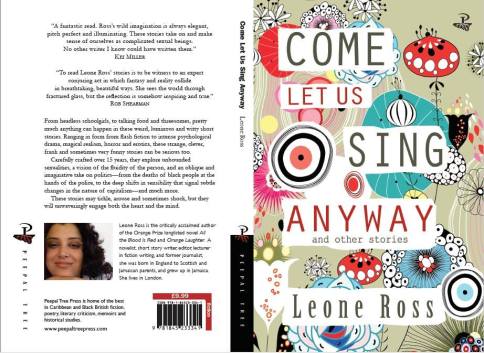


















 Kay recalls Cassandra’s Conflict, by Frederica Allen, as her introduction to the world of BDSM/S&M literature. She remembers, “It made me realise that you could read about pushing sexual boundaries, taking pleasure from reading, without entering that world yourself.” It was another decade before she put pen to paper, but Kay believes this book had greater influence than she initially realised.
Kay recalls Cassandra’s Conflict, by Frederica Allen, as her introduction to the world of BDSM/S&M literature. She remembers, “It made me realise that you could read about pushing sexual boundaries, taking pleasure from reading, without entering that world yourself.” It was another decade before she put pen to paper, but Kay believes this book had greater influence than she initially realised.
 Of her most recent work of erotica, Wednesday on Thursday, Kay says, “I’m fascinated by words. Their origins, the way we use them and the power they have. What could happen, I wondered, if someone became obsessed with how individuals react to certain words when used in certain situations? Certain erotic situations…”
Of her most recent work of erotica, Wednesday on Thursday, Kay says, “I’m fascinated by words. Their origins, the way we use them and the power they have. What could happen, I wondered, if someone became obsessed with how individuals react to certain words when used in certain situations? Certain erotic situations…”



 Janine also names Angela Carter’s Bloody Chamber as an influence on her own short stories, for style and erotic/fairytale subject matter.
Janine also names Angela Carter’s Bloody Chamber as an influence on her own short stories, for style and erotic/fairytale subject matter.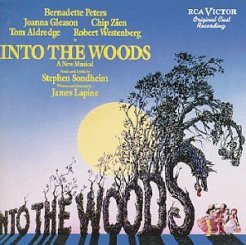 as have Sondheim’s lyrics, which move and inspire her, being ‘clever and emotionally complex’. She enjoys musicals at the tragic end of the spectrum: Cabaret and Jesus Christ Superstar, and Sondheim’s Into the Woods.
as have Sondheim’s lyrics, which move and inspire her, being ‘clever and emotionally complex’. She enjoys musicals at the tragic end of the spectrum: Cabaret and Jesus Christ Superstar, and Sondheim’s Into the Woods.
 When Milja Petak released the fallen angel Azazel from five thousand years of imprisonment, she did it out of love and pity. She found herself in a passionate sexual relationship beyond her imagining and control – the beloved plaything of a dark and furious demon who takes what he wants, when he wants, and submits to no restraint. But what she hasn’t bargained on is being drawn into his plan to free all his incarcerated brothers and wage a war against the Powers of Heaven.
When Milja Petak released the fallen angel Azazel from five thousand years of imprisonment, she did it out of love and pity. She found herself in a passionate sexual relationship beyond her imagining and control – the beloved plaything of a dark and furious demon who takes what he wants, when he wants, and submits to no restraint. But what she hasn’t bargained on is being drawn into his plan to free all his incarcerated brothers and wage a war against the Powers of Heaven. imprison Azazel for all eternity.
imprison Azazel for all eternity. You may like to visit Janine’s
You may like to visit Janine’s 






 Struggling writer, Kelly Blake has a secret life as a sex tutor. Celebrated sculptor and recluse, Alexander ‘Lex’ Valentine, can’t stand to be touched. When he seeks out Kelly’s advice incognito, the results are too hot to handle. When Kelly terminates their sessions due to what she considers to be her unprofessional behavior, Lex takes a huge risk, revealing his identity to her at a gala exhibition, his first ever public appearance. When Kelly helps the severely haphephobic Lex escape the grope of reporters and paparazzi, rumors fly that the two are engaged, rumors encouraged by well-meaning friends and colleagues. The press feeding frenzy forces Kelly into hiding at Lex’s mansion where he convinces her to be his private tutor just until the press loses interest, and she can go back home. They discover quickly that touch is not essential for sizzling, pulse-pounding intimacy. But intimacy must survive secrets uncovered, as their sessions become more and more personal.
Struggling writer, Kelly Blake has a secret life as a sex tutor. Celebrated sculptor and recluse, Alexander ‘Lex’ Valentine, can’t stand to be touched. When he seeks out Kelly’s advice incognito, the results are too hot to handle. When Kelly terminates their sessions due to what she considers to be her unprofessional behavior, Lex takes a huge risk, revealing his identity to her at a gala exhibition, his first ever public appearance. When Kelly helps the severely haphephobic Lex escape the grope of reporters and paparazzi, rumors fly that the two are engaged, rumors encouraged by well-meaning friends and colleagues. The press feeding frenzy forces Kelly into hiding at Lex’s mansion where he convinces her to be his private tutor just until the press loses interest, and she can go back home. They discover quickly that touch is not essential for sizzling, pulse-pounding intimacy. But intimacy must survive secrets uncovered, as their sessions become more and more personal. touching. From well-detailed interactions to the steamy interludes, this is a story that is blazing hot.” 5 out of 5,
touching. From well-detailed interactions to the steamy interludes, this is a story that is blazing hot.” 5 out of 5, 

 Among her favourite such reads is David Schickler’s Kissing In Manhattan collection, which gives readers a ‘strange and seemingly random cast of characters, centred on a mythic Manhattan apartment complex called The Preemption’.
Among her favourite such reads is David Schickler’s Kissing In Manhattan collection, which gives readers a ‘strange and seemingly random cast of characters, centred on a mythic Manhattan apartment complex called The Preemption’. has ever seen before but, if they go too far or are overdone, the film falls flat. For me, kink scenes follow the same logic. I want my sexy story bits to be steamy and hot, but I want to be sure that they’re still grounded in something real. Do body parts actually move and react that way? Is proper safety, negotiation, and consent being observed? Does the kink serve a purpose to the plot and character development or is it more flash over substance?”
has ever seen before but, if they go too far or are overdone, the film falls flat. For me, kink scenes follow the same logic. I want my sexy story bits to be steamy and hot, but I want to be sure that they’re still grounded in something real. Do body parts actually move and react that way? Is proper safety, negotiation, and consent being observed? Does the kink serve a purpose to the plot and character development or is it more flash over substance?”



 About the author
About the author


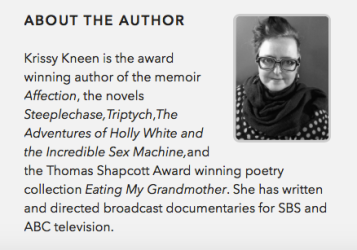
 Krissy explains that her love of literature began when her grandmother would pay her 20c for reading and reviewing books. She adds, “I moved on from stories about mice to Moomintroll, and by the time I hit Ray Bradbury I no longer needed the money. The books themselves became the reward. I started to write because books like R is for Rocket and S is for Space by Bradbury left so much space for me as a reader that I needed to add to the dialogue.”
Krissy explains that her love of literature began when her grandmother would pay her 20c for reading and reviewing books. She adds, “I moved on from stories about mice to Moomintroll, and by the time I hit Ray Bradbury I no longer needed the money. The books themselves became the reward. I started to write because books like R is for Rocket and S is for Space by Bradbury left so much space for me as a reader that I needed to add to the dialogue.” It comes as no surprise that art has inspired Krissy’s work. Her family are visual artists and, as well as designing the sets for a couple of theatre shows in her youth, she enjoyed her own art exhibition. Her Triptych comprises three conjoined novellas, each named after, and referencing, well-known paintings: The Dream of the Fisherman’s Wife, by Katsushika Hokusai; Susanna and the Elders, by Artemesia Gentileshi, and Romulus and Remus, by Peter Paul Rubens. Krissy stresses, “I can’t seem to write anything without the inspiration of the visual arts.” An Uncertain Grace is inspired by a photo created by Sebastio Salgado, which holds a central position in her narrative.
It comes as no surprise that art has inspired Krissy’s work. Her family are visual artists and, as well as designing the sets for a couple of theatre shows in her youth, she enjoyed her own art exhibition. Her Triptych comprises three conjoined novellas, each named after, and referencing, well-known paintings: The Dream of the Fisherman’s Wife, by Katsushika Hokusai; Susanna and the Elders, by Artemesia Gentileshi, and Romulus and Remus, by Peter Paul Rubens. Krissy stresses, “I can’t seem to write anything without the inspiration of the visual arts.” An Uncertain Grace is inspired by a photo created by Sebastio Salgado, which holds a central position in her narrative. best and worst selves, our innermost selves—and who we might become.
best and worst selves, our innermost selves—and who we might become.

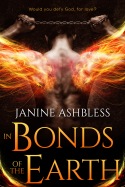 the Watchers trilogy: In Bonds of the Earth. It’s a thought-provoking and immersive novel, setting new standards for paranormal erotic romance. Janine’s authorial style is unforgettable. She likes to write about magic, myth and mystery, dangerous power dynamics, borderline terror, and the not-quite-human. She takes exciting risks in her storytelling; she’s innovative, and she brings fierce intelligence to all she writes.
the Watchers trilogy: In Bonds of the Earth. It’s a thought-provoking and immersive novel, setting new standards for paranormal erotic romance. Janine’s authorial style is unforgettable. She likes to write about magic, myth and mystery, dangerous power dynamics, borderline terror, and the not-quite-human. She takes exciting risks in her storytelling; she’s innovative, and she brings fierce intelligence to all she writes.  “Stretching up into the great vertical space of the tower, they had become a living helix of light—a caduceus coiled about the pillar of the world. I thought of all the legends from across the Earth. I thought of the Garden of Eden and the Great Dragon of Saint John’s Revelation; stories bookending the whole of human history.
“Stretching up into the great vertical space of the tower, they had become a living helix of light—a caduceus coiled about the pillar of the world. I thought of all the legends from across the Earth. I thought of the Garden of Eden and the Great Dragon of Saint John’s Revelation; stories bookending the whole of human history.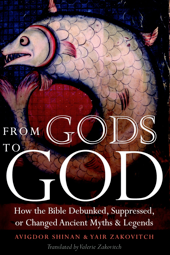 with hands (remember that the Serpent of Eden is punished by being made to crawl in the dust, strongly suggested that it previously had other forms of locomotion).
with hands (remember that the Serpent of Eden is punished by being made to crawl in the dust, strongly suggested that it previously had other forms of locomotion).
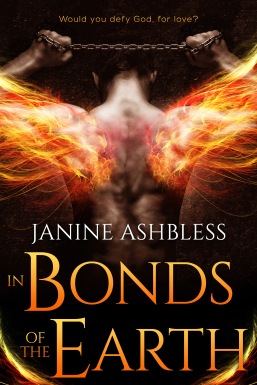 “Broad at the shoulders and lean at the hips, six foot-and-then-something of ropey muscle, he looks like a Spartan god who got lost in a thrift store. He moves like ink through water. And his eyes, when you get a good look at them, are silver. Not gray. Silver. You might take their inhuman shine for fancy contact lenses. You’d be wrong.” – In Bonds of the Earth
“Broad at the shoulders and lean at the hips, six foot-and-then-something of ropey muscle, he looks like a Spartan god who got lost in a thrift store. He moves like ink through water. And his eyes, when you get a good look at them, are silver. Not gray. Silver. You might take their inhuman shine for fancy contact lenses. You’d be wrong.” – In Bonds of the Earth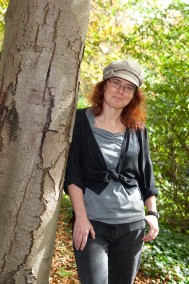


 Our psyche comprises contradictory elements. Linnea, we are told, is ‘an alloy’, stronger than the metals from which she is made. A powerful metaphor in the story is given through Linnea’s sculptures, which comprise contrasting, yet harmonising materials: hickory and chestnut or oak and walnut. They symbolize Linnea’s inner being. ‘There are three tiny knots… clustered like moles on a woman’s shoulder.’ This metaphor continues. ‘The twisting shapes hint at lovers entangled ankle to throat’, bound by fine steel wire, brass straps, clear glass bands, rough rope knotted. Linnea’s art is a visual representation of what she desires for herself: bondage and forced compliance. We are told that ‘wood fucks wood’ and that the scent is ‘musky, human’.
Our psyche comprises contradictory elements. Linnea, we are told, is ‘an alloy’, stronger than the metals from which she is made. A powerful metaphor in the story is given through Linnea’s sculptures, which comprise contrasting, yet harmonising materials: hickory and chestnut or oak and walnut. They symbolize Linnea’s inner being. ‘There are three tiny knots… clustered like moles on a woman’s shoulder.’ This metaphor continues. ‘The twisting shapes hint at lovers entangled ankle to throat’, bound by fine steel wire, brass straps, clear glass bands, rough rope knotted. Linnea’s art is a visual representation of what she desires for herself: bondage and forced compliance. We are told that ‘wood fucks wood’ and that the scent is ‘musky, human’. enclosure, I knew she would become obsessive about the walls: that she would make art from this constraint, as well.
enclosure, I knew she would become obsessive about the walls: that she would make art from this constraint, as well.  with interest. He is dropping into the strange, abstract space where she stops being entirely real to him, where he stops being real to himself: the no-place that is all places, and their bodies become geometries and his body and brain divide themselves into pieces simultaneously dissociative and entirely, pulsingly, engaged.’
with interest. He is dropping into the strange, abstract space where she stops being entirely real to him, where he stops being real to himself: the no-place that is all places, and their bodies become geometries and his body and brain divide themselves into pieces simultaneously dissociative and entirely, pulsingly, engaged.’ protagonists?
protagonists? outside spaces – looking inward and outward. Linnea struggles against Alex’s constraint of her freedom, but we come to see that her constraint is also internal. ‘She’s a coyote in a leg-hold trap, chewing at her own ankle.’ When she asks what he wants from her, he laughs, evading, ‘because the answer is love and he cannot admit that’. Linnea evades, as well. ‘It is not the house and enclosure that blocks honesty; their constraints travel with them.’
outside spaces – looking inward and outward. Linnea struggles against Alex’s constraint of her freedom, but we come to see that her constraint is also internal. ‘She’s a coyote in a leg-hold trap, chewing at her own ankle.’ When she asks what he wants from her, he laughs, evading, ‘because the answer is love and he cannot admit that’. Linnea evades, as well. ‘It is not the house and enclosure that blocks honesty; their constraints travel with them.’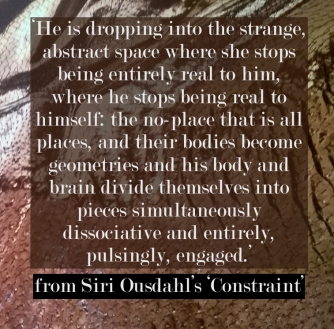 anyone. She resists, saying, “No one is anyone’s.” Later, taunted by dominatrix Klee, Linnea asserts, “I am not yours. I am no one’s.” Klee responds, “So sad. We all belong to someone…”
anyone. She resists, saying, “No one is anyone’s.” Later, taunted by dominatrix Klee, Linnea asserts, “I am not yours. I am no one’s.” Klee responds, “So sad. We all belong to someone…” will stay together as things are, but there’s a sequel I have thought about that starts six months from now, when Linnea has left Alex and ends up in Switzerland, using Klee, Berndt, Vadim (and others) to make sense of her experience. Can they return to one another after that? Depends on the next book.
will stay together as things are, but there’s a sequel I have thought about that starts six months from now, when Linnea has left Alex and ends up in Switzerland, using Klee, Berndt, Vadim (and others) to make sense of her experience. Can they return to one another after that? Depends on the next book. 
 I’m also researching an erotic fantasy novel! Yes, research: I can’t bring myself to write anything without lots and lots of reading ahead of time.
I’m also researching an erotic fantasy novel! Yes, research: I can’t bring myself to write anything without lots and lots of reading ahead of time. 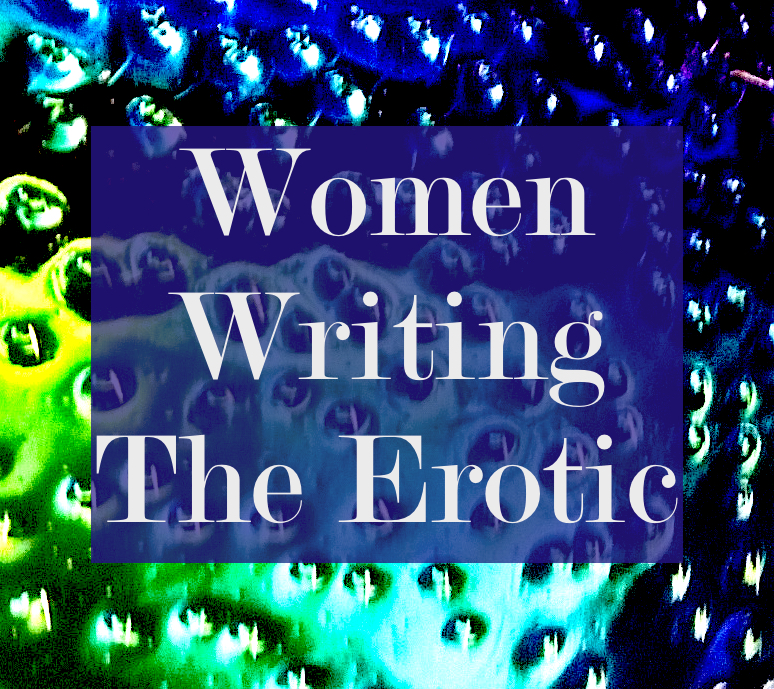

 share of authors, and our voices are growing louder.
share of authors, and our voices are growing louder. There’s still a degree of censorship, and traditional publishers remain somewhat cautious about stepping outside of the box, but, if we keep writing up against the boundaries, inch by inch, they will surely come down.
There’s still a degree of censorship, and traditional publishers remain somewhat cautious about stepping outside of the box, but, if we keep writing up against the boundaries, inch by inch, they will surely come down.
 It’s true that some elements of the human condition are universal. We all, surely, know what it is to love, to despair, to smile, or to regret. We know the fragility of life and we share wonder in the world we inhabit.
It’s true that some elements of the human condition are universal. We all, surely, know what it is to love, to despair, to smile, or to regret. We know the fragility of life and we share wonder in the world we inhabit. As Cecilia Tan states, “I was put on Earth to write but it wasn’t until I started writing erotic fiction that I found my voice. I want a world where sexual freedom, not sexual oppression, is the norm, and so I write about sexual pleasure and fulfillment.”
As Cecilia Tan states, “I was put on Earth to write but it wasn’t until I started writing erotic fiction that I found my voice. I want a world where sexual freedom, not sexual oppression, is the norm, and so I write about sexual pleasure and fulfillment.” as well as a creative one’. She explains, “French feminist Helene Cixous phrased it beautifully in an essay called ‘Laugh of the Medusa’ – ‘Write yourself. Your body must be heard.’ I think this applies to all women’s stories, but particularly those around sexuality. The political aspect of it, the desire to confront and subvert, is a strong motivation for me – as strong as the desire to seduce and arouse.”
as well as a creative one’. She explains, “French feminist Helene Cixous phrased it beautifully in an essay called ‘Laugh of the Medusa’ – ‘Write yourself. Your body must be heard.’ I think this applies to all women’s stories, but particularly those around sexuality. The political aspect of it, the desire to confront and subvert, is a strong motivation for me – as strong as the desire to seduce and arouse.” that some readers have criticized her writing of female protagonists who lack ‘the same moral compass’ as themselves. She notes, “I call these cardboard cut out heroines. From my personal experience, people make crazy decisions when it comes to love and passion.” She asserts that ‘flawed, impulsive, manipulative heroines’ breathe life into fiction.
that some readers have criticized her writing of female protagonists who lack ‘the same moral compass’ as themselves. She notes, “I call these cardboard cut out heroines. From my personal experience, people make crazy decisions when it comes to love and passion.” She asserts that ‘flawed, impulsive, manipulative heroines’ breathe life into fiction. some authors mention a desire to explore the realm of non-consent.
some authors mention a desire to explore the realm of non-consent. preoccupy myself with it as I write would be to stymie the story before it’s even formed. While I acknowledge the reality of censorship, I try not to let it, or fear of it, influence my writing. I serve the story. If it trips censors, so be it. I have the luxury of pulling it and sending it elsewhere.“
preoccupy myself with it as I write would be to stymie the story before it’s even formed. While I acknowledge the reality of censorship, I try not to let it, or fear of it, influence my writing. I serve the story. If it trips censors, so be it. I have the luxury of pulling it and sending it elsewhere.“ However, KD Grace stresses that this generates an attitude of ‘us against the world and circle the wagons’ and ‘a real sense of camaraderie among erotica writers (with little of the petty jealousy I’ve seen among writers in some other genres).’ She feels the erotica writing community as ‘a family’, saying, “That encouragement has meant a lot to me through the years.”
However, KD Grace stresses that this generates an attitude of ‘us against the world and circle the wagons’ and ‘a real sense of camaraderie among erotica writers (with little of the petty jealousy I’ve seen among writers in some other genres).’ She feels the erotica writing community as ‘a family’, saying, “That encouragement has meant a lot to me through the years.” desire. I think it put light on the seed already in me to find new and evocative ways of writing about feminine desire and describing the desiring female body.”
desire. I think it put light on the seed already in me to find new and evocative ways of writing about feminine desire and describing the desiring female body.” thing that truly inspires me to silence the inner critic and just write and enjoy the pleasure of speaking the unspeakable.”
thing that truly inspires me to silence the inner critic and just write and enjoy the pleasure of speaking the unspeakable.” and our fears. We emerge changed and, as RG tells us, we ‘expose something true’ of ourselves (more
and our fears. We emerge changed and, as RG tells us, we ‘expose something true’ of ourselves (more